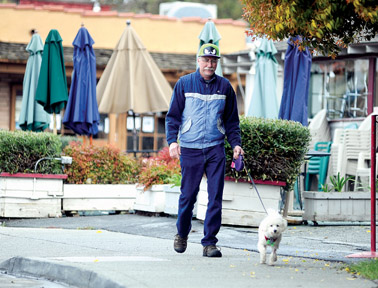
City Council considers making it an infraction not to pick up after pets
First, it worked to limit the population of feral street chickens. Now, the San Juan Bautista City Council has turned its attention to dogs whose owners don’t clean up after their pets in public parks.
The council, which last year considered hiring a chicken wrangler before settling on bringing pens to residents who rounded up wild fowl, is now discussing amending its animal control ordinance to require dog walkers to remove and dispose of animal waste on public property or face a citation.
“The council has been getting complaints about dogs running through Verutti Park, Abbe Park, the Luck Library lawn and other parks, defecating and relieving themselves,” said City Manager Roger Grimsley. “It’s a problem for our maintenance staff.”
Updating the existing ordinance would make not cleaning up after a dog on public property an infraction for which citizens would have to pay an as-yet-undetermined fine.
The matter was discussed at the March 20 council meeting and forwarded to the city attorney for more research. It is expected to come back before the council at its April 17 meeting.
“We searched other cities, and they have ‘pooper scooper’ ordinance provisions in which the person walking a dog is required to clean up after it,” Grimsley said.
Asked who would enforce the ordinance and issue citations, Grimsley said, “the sheriff’s department is who we contract with for law enforcement and we also want to give authority to our maintenance workers so they have the right to issue a citation.”
Dog messes have been less of an issue in the city’s downtown retail corridor, Grimsley noted, and he had not heard complaints from state park employees at the San Juan Mission grounds, though the ordinance would be in effect there as well.
Mayor Jolene Cosio said that when she walks her dog, she always carries a bag with her to clean up after the animal.
“Some dogs do poop on sidewalks, which surprises me,” she said. “Mine likes to go on grass or in an open field. We’d like for people to get in the habit of carrying a bag with them. It’s a problem for city workers because when they are running a lawn mower, they have to stop” if they encounter a mess left behind by a dog.
Cosio said the city does not want to “go to extremes” with its rules about issuing citations to pet owners.
“It’s an issue with city parks and mostly where children play,” she said. “We want to keep our city lawns looking nice. In my mind, if my dog poops on a lawn I’m going to pick it up.”
Any pooper-scooper laws enacted in San Juan would not apply to private property, she noted.
“We want people to keep their dogs under control,” Cosio said. “More people have dogs and a lot of people just aren’t as conscientious” as they used to be.
Discussion about possible penalties for breaking the pooper-scooper rules was not held, the mayor said, “because the entire council didn’t feel the same about how they wanted the rules to be written.”
“I myself made the comment that we don’t want to end up with an ordinance we can’t enforce or that nobody wants to take the time to enforce,” she said.
Allowing city workers to have the power to issue citations for violations of a pooper-scooper ordinance would help enforce the rules, Cosio said.
“We’re hoping eventually we get in a situation where any individual connected with the city can write a citation,” she said. “It’s going to require some working with our attorney. I see no reason why public works employees can’t write a citation. If it’s not a misdemeanor – it’s only an infraction – city workers can do it. Even council members might be able to do it.”
The issue is expected to be revisited by the council at its April 17 meeting.
10 Reasons to scoop up after dogs
1. Stormwater carries pet waste and other pollutants directly into waterways.
2. Animal waste adds nitrogen to the water. Excess nitrogen depletes the oxygen in water necessary for beneficial underwater grasses, wildlife and fish.
3. Animal waste may contain harmful organisms such as Giardia, Salmonella and E. coli that can be transmitted to humans and other animals by ingesting contaminated water.
4. Roundworms and hookworms deposited by infected animals can live in the soil for long periods of time and be transmitted to other animals and humans.
5. Many urban and suburban areas require you to pick up after your pet. Even if there is no restriction, cleaning up after your pet is always the right thing to do.
6. Joining the growing number of responsible pet owners may encourage hotel managers to accept pets when you are traveling and help keep fees to a minimum.
7. No one likes to step in pet waste and spread it into homes, cars and businesses.
8. Scooping on a daily basis and applying lime will help prevent odors.
9. It’s easy to clean up by carrying plastic baggies and paper towels in your pocket. The baggies can be secured and thrown away in the garbage.
10. Your neighbors will appreciate your good manners.
source: petfinder.com









